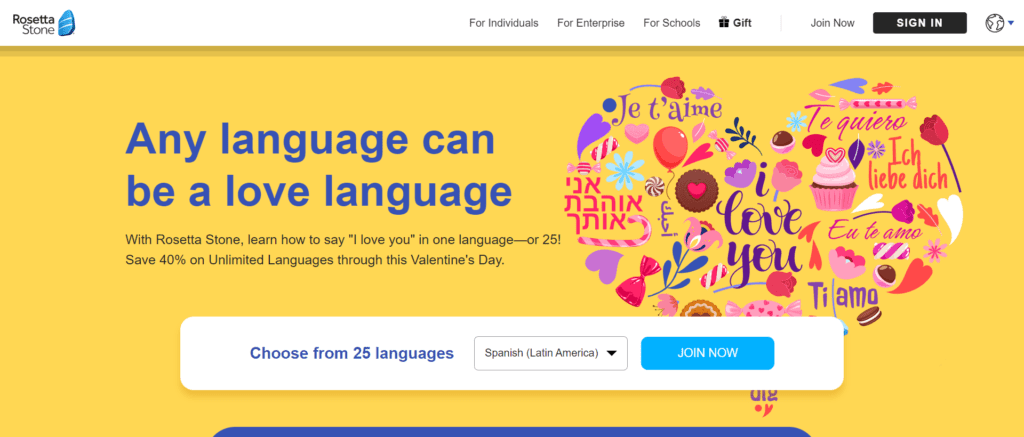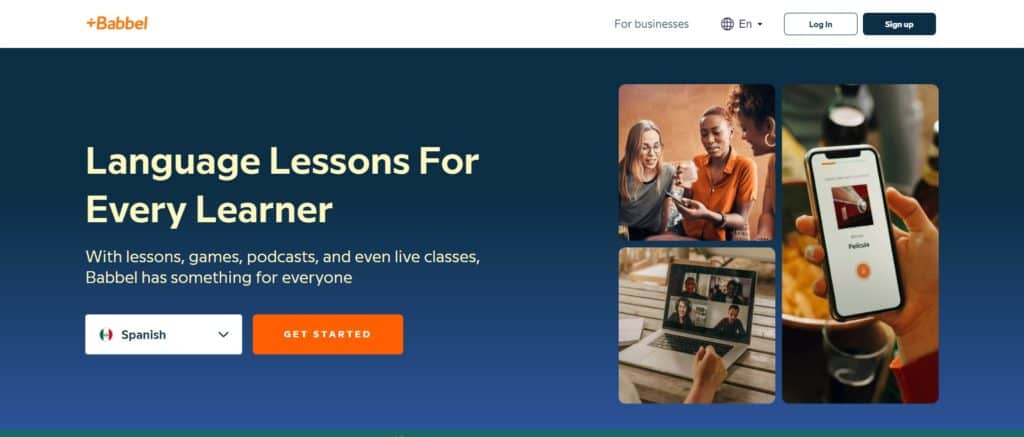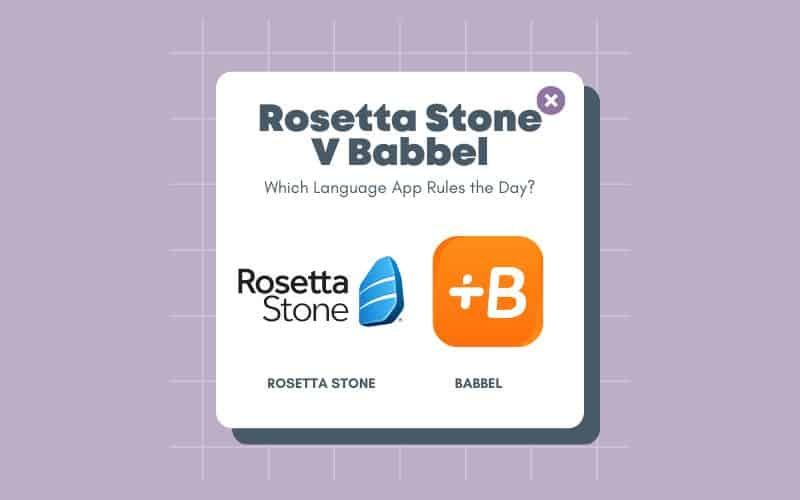Welcome to the great debate: Rosetta Stone vs Babble. If you’re looking to learn a new language, you may have heard of these popular language learning apps. While both apps offer effective ways to learn a new language, they have different teaching methods, language options, and user experiences.
Let’s dive into the details and find out: Is Babbel or Rosetta Stone better for you?
Rosetta Stone Bird’s Eye View: How good is Rosetta Stone?

If you’re looking for an app that can make learning a new language feel like a breeze, Rosetta Stone might just be a good fit for you. Rosetta Stone is a language learning app that has been around for quite some time now and is known for its immersive teaching method that helpusers pick up a new language fairly quickly.
Features we like: Rosetta Stone
Immersive learning method: Learn the language through pictures, audio, and interactive activities instead of memorizing vocabulary and grammar rules
Speech recognition technology: Provides instant feedback on your pronunciation and helps you improve your speaking skills
Adaptive learning: Adjusts to your learning style and pace, making the learning process more personalized
Language coaching: Offers coaching to help you improve your skills and provide feedback.
Pros / Cons of Rosetta Stone
| Pros | Cons |
|---|---|
| Immersive learning method mimics real-life language learning | High price compared to other language learning apps |
| Speech recognition technology provides instant feedback on pronunciation | Limited interaction with native speakers |
| Adaptive learning feature adjusts to individual learning style | No grammar explanations or translations provided, may not be suitable for more advanced learners. |
| Language coaching provides personalized feedback and helps improve language skills |
All in all, Rosetta Stone is a great option for those who want to learn a new language in an immersive and engaging way. While it may be a bit pricey and lacking in some areas, its comprehensive teaching style and personalized approach make it a top contender in the language learning space.
Our #1 Language Course ????

Babbel Bird’s Eye View: Is Babbel Good?

If you’re looking to learn a new language, you’ve likely come across Babbel. This app is well known for its focus on practical conversation skills, making it a popular choice for those who want to learn a language for real-life situations.
Let’s take a closer look at Babbel’s features, pros, and cons to see if it’s the right choice for you.
Features We Like: Babbel
Babbel offers a range of features to help users learn a new language. Some of its notable features include:
Conversational lessons: Babbel’s lessons are designed to help users learn how to speak in real-life situations. This means that you’ll learn useful phrases and vocabulary that you can use when traveling or communicating with native speakers.
Speech recognition technology: Babbel uses speech recognition technology to help users improve their pronunciation. This feature provides instant feedback on how well you’re pronouncing words, allowing you to make adjustments and improve your skills.
Review and practice sessions: Babbel offers review and practice sessions to help users reinforce what they’ve learned. These sessions are designed to help you retain information and apply it in practical situations.
Personalized learning plans: Babbel creates personalized learning plans for each user based on their learning style and goals. This means that you’ll receive a customized learning experience that caters to your individual needs.
Pros / Cons of Babbel
| Pros | Cons |
|---|---|
| Focus on practical conversation skills | Limited grammar instruction |
| Speech recognition technology provides instant feedback | Less immersive learning method |
| Review and practice sessions reinforce learning | Limited interaction with native speakers |
| Personalized learning plans cater to individual needs | May not be suitable for more advanced learners |
Babbel is a great choice for those who want to learn a new language for real-life situations. Its focus on practical conversation skills, speech recognition technology, review and practice sessions, and personalized learning plans make it an effective and enjoyable language learning app.
Our #1 Language Course ????

Rosetta stone v Babble: Price comparison
Let’s compare the cost of two popular language learning apps: Rosetta Stone and Babbel.
Rosetta Stone pricing
Rosetta Stone offers two types of subscription plans: single language and unlimited languages. If you only want to learn one language, you can choose the single language plan. However, if you want to learn multiple languages, you can opt for the unlimited languages plan.
The current pricing for the single language plan is $11.95 per month for a 3-month subscription and $7.99 per month for a 12-month subscription. If you’re serious about learning a new language and want to go all-in, Rosetta Stone offers a lifetime subscription for unlimited languages at a one-time cost of $189.00.
For those who want even more support, Rosetta Stone also offers a Lifetime Plus plan that includes group coaching for a one-time cost of $299.00.
Babbel pricing
Babbel offers four different subscription plans: 1 month, 3 months, 6 months, and 12 months. The current pricing for Babbel starts at $12.95 per month for a 1-month subscription, but the price per month goes down as you commit to a longer subscription. For example, the price per month drops to $8.95 for a 3-month subscription, $7.45 for a 6-month subscription, and $6.95 for a 12-month subscription.
Babbel vs Rosetta Stone Which is more affordable?
When it comes to cost, Babbel’s 12-month subscription plan is the most affordable option, costing only $83.40 per year.
Rosetta Stone’s 12-month subscription plan costs $95.88 per year. However, if you’re looking for a lifetime subscription, Rosetta Stone’s one-time cost of $189.00 may be more appealing than Babbel’s subscription-based model.
In terms of value for money, both apps are high quality but have different styles.
Rosetta Stone provides a more immersive learning experience and offers group coaching through its Lifetime Plus plan, but it can be more expensive in the long run.
Meanwhile, Babbel’s focus on practical conversation skills, speech recognition technology, and personalized learning plans may make it a more cost-effective option for those who want to learn a new language on a budget.
Looking for more options? See our top language apps and Duolingo Alternatives!
Is Babbel or Rosetta Stone Better?
Rosetta Stone vs Babble…. it can be difficult to know which app is right for you. That’s why we’ve taken a closer look at two of the most popular language learning apps. But if you’re still undecide…. Let’s look a little deeper and find out which is better Babbel or Rosetta Stone?
Teaching Method
Rosetta Stone is known for its immersive teaching method, which involves learning a new language through pictures, videos, and audio exercises. The app uses an intuitive, image-based approach to teaching new vocabulary and grammar.
Babbel uses a conversational teaching method, which focuses on real-life situations and dialogues to help you become more confident in speaking the language. While both methods have their pros and cons, the best teaching method for you will depend on your personal learning style.
If you’re a visual learner who prefers to learn through pictures and videos, Rosetta Stone might be the better choice for you. However, if you’re someone who wants to focus more on speaking and communicating in a new language, Babbel’s conversational teaching method might be more appealing.
Language Options
When it comes to language options, both apps have a lot to offer. Rosetta Stone offers 25 different languages, while Babbel offers 14 so you may be left with only one option if it is your preferred language.
If you’re looking to learn a less commonly taught language, Rosetta Stone may be the better choice due to its wider range of language options. However, if you’re looking to learn a more commonly taught language, Babbel’s high-quality instruction may be a better fit.
User Experience
Both Rosetta Stone and Babbel offer sleek, user-friendly modern interfaces that make language learning fun and engaging.
Both apps offer additional features, such as speech recognition and personalized feedback, to help you improve your language skills.
When it comes to user experience it’s hard to pull a winner as everyone of our readers is going to want a bit different look and feel – IF user experience is the deciding factor for you…. We recommend using the free trial of each and getting a better grasp for you personally.
Our Pick for Best Pick For an Online Course: Synergy Spanish
In our opinion, this is a fantastic program for those who are interested in learning how to speak Spanish, not fluently, but pretty darn well at the beginner level. This course has a lot of great things going for it and we think you’ll have a fantastic experience using Synergy Spanish – it does what it says it’s going to do.
Get Started for Free
Rosetta Stone v Babbel – Who takes the crown?
We found that both Rosetta Stone and Babbel are excellent language learning apps that offer unique features and benefits. Rosetta Stone’s immersive teaching method is great for beginners who want to develop a strong foundation in the language, while Babbel’s conversational approach is perfect for those who want to focus on practical communication skills.
Personalized recommendation based on learning goals
So, which app is right for you? It ultimately depends on your specific language learning goals and preferences. If you’re a beginner looking to develop a strong foundation in a language, or if you’re interested in less commonly taught languages, Rosetta Stone might be the best option for you.
On the other hand, if you’re looking to focus on practical communication skills and want a more user-friendly app, Babbel is the way to go. Additionally, if you’re interested in learning multiple languages, Babbel offers a more affordable and convenient option.
Final thoughts
Learning a new language can be challenging, but it’s also an incredibly rewarding experience. Whether you’re moving here to Mexico or just planning a trip, want to communicate with family or friends, or just want to challenge yourself, language learning apps like Rosetta Stone and Babbel are an excellent tool to help you achieve your goals but still not our favorite overall for language learning…. See our #1 Choice below!
Our #1 Language Course ????

FAQs Babble vs Rosetta Stone
Both Rosetta Stone and Babbel offer a variety of pricing options depending on the length of time you want to use the app. Rosetta Stone offers plans starting at $11.99/month, while Babbel offers plans starting at $12.95/month.
Yes, both Rosetta Stone and Babbel offer free trials. Rosetta Stone offers a 3-day trial, while Babbel offers a 7-day trial. This gives you the chance to test out the app and see if it’s the right fit for you before committing to a paid plan.
This is a tough question to answer, as everyone learns at their own pace and there are many factors that can impact the time it takes to learn a language. However, both Rosetta Stone and Babbel are designed to help you make progress quickly and efficiently. With regular use, you could see results in as little as a few weeks.
Absolutely! Both Rosetta Stone and Babbel are designed to be beginner-friendly, and they provide plenty of resources to help you get started.
Yes! Studies have shown that language learning apps can be highly effective, especially when used consistently over time. Of course, results will vary depending on the individual and the app in question, but many users have found success with these apps.
While fluency is certainly a lofty goal, it’s not something that can be achieved overnight (or even in a few months). However, with regular use of a language program, you can certainly make progress toward fluency. The key is to stay committed and to practice regularly.
Ready to Put Your Spanish to Use? Let’s find your perfect home in Mazatlan!










One Response